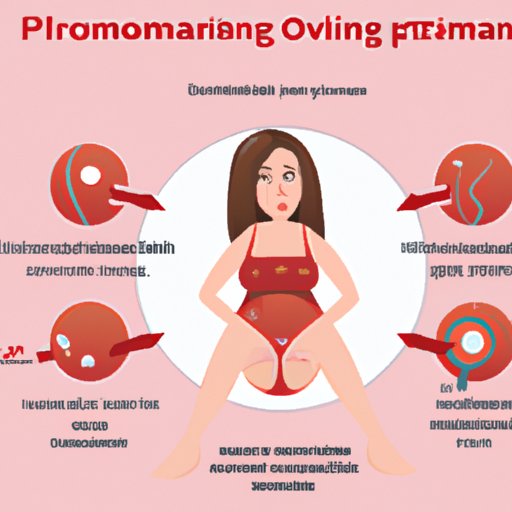
Introduction
Pregnancy is an exciting time filled with many changes and new experiences. One thing that many women wonder about is whether they will still experience ovulation symptoms during pregnancy. In this article, we’ll explore the facts and myths surrounding ovulation symptoms and pregnancy.
First, let’s define what we mean by ovulation symptoms and pregnancy symptoms.
Ovulation symptoms are typically experienced during a woman’s menstrual cycle. They can include cramping, bloating, changes in cervical mucus, and a heightened sense of smell. These symptoms are caused by hormonal changes in the body as it prepares for ovulation.
Pregnancy symptoms, on the other hand, are caused by the hormonal changes that occur after conception. These can include nausea, fatigue, breast tenderness, and frequent urination, among others.
The Truth About Ovulation Symptoms During Pregnancy
Many women wonder if they will continue to experience ovulation symptoms after they become pregnant. The answer is not straightforward, as it depends on a number of factors.
During pregnancy, the body undergoes many changes. Hormone levels shift dramatically, and the uterus and cervix prepare for the growing fetus. While some women may continue to experience ovulation symptoms during pregnancy, others may not.
It’s important to note that ovulation itself does not occur during pregnancy. Once a woman becomes pregnant, ovulation ceases until after the baby is born. However, the hormonal changes that occur during pregnancy can sometimes cause symptoms that mimic ovulation.
Debunking the Myths: How Pregnancy Affects Ovulation Symptoms
There are many myths and misconceptions about ovulation symptoms and pregnancy. One of the most common myths is that a woman can still ovulate while pregnant. This is not true – once a woman becomes pregnant, the ovary stops releasing eggs.
Another common misconception is that women will continue to experience typical ovulation symptoms during pregnancy. While some women may experience symptoms that mimic ovulation, such as cramping and changes in cervical mucus, these symptoms are not actually caused by ovulation.
It’s important to understand the difference between pregnancy symptoms and ovulation symptoms. While some symptoms may overlap, there are key differences between the two that can help women understand what is happening in their bodies.
Can You Still Experience Ovulation Symptoms While Pregnant?
As we’ve discussed, some women may still experience symptoms that mimic ovulation during pregnancy. This is due to the hormonal changes that occur in the body.
However, it’s important to note that experiencing ovulation symptoms during pregnancy is relatively uncommon. Most women will not experience these symptoms once they become pregnant.
If you do experience symptoms that you believe are related to ovulation, it’s important to talk to your healthcare provider. They can help you understand what is happening in your body and ensure that there are no underlying complications.
How to Tell the Difference Between Pregnancy and Ovulation Symptoms
As we’ve mentioned, there are some similarities between pregnancy and ovulation symptoms. However, there are also key differences that can help you differentiate between the two.
Common pregnancy symptoms include:
- Nausea and vomiting
- Food cravings or aversions
- Increased fatigue
- Breast tenderness
- Changes in mood
Common ovulation symptoms include:
- Cramping
- Changes in cervical mucus
- Increased sex drive
- Bloating
If you’re unsure whether the symptoms you’re experiencing are related to ovulation or pregnancy, talk to your healthcare provider. They can help you understand what is happening in your body and provide advice on how to manage any discomfort you may be experiencing.

Understanding the Changes in Your Body During Pregnancy
Pregnancy is a time of incredible change for the body. From hormonal shifts to the growth and development of the fetus, there are many things happening inside a woman’s body during this time.
Some women may experience symptoms that mimic ovulation because of the changes happening in their bodies. For example, cramping and bloating can be caused by the uterus stretching to accommodate the growing fetus. Changes in cervical mucus can also be a result of hormonal shifts.
It’s important to talk to your healthcare provider about any symptoms you’re experiencing during pregnancy. They can help you understand what is happening and provide advice on how to manage any discomfort.
Pregnancy Symptoms vs. Ovulation Symptoms: What You Need to Know
Understanding the difference between pregnancy and ovulation symptoms is important for women who are pregnant. While some symptoms may be similar, the underlying causes are very different.
If you’re experiencing symptoms that you believe may be related to ovulation, it’s important to talk to your healthcare provider. They can help you understand what is happening in your body and ensure that there are no underlying complications.
Ultimately, the best way to determine whether you’re experiencing ovulation or pregnancy symptoms is to talk to a healthcare provider. They can help you understand what is happening in your body and provide advice on how to manage any discomfort you may be experiencing.
The Surprising Link Between Ovulation Symptoms and Pregnancy
While ovulation does not occur during pregnancy, there is a surprising link between ovulation symptoms and pregnancy.
Research has shown that women who experience symptoms like bloating and cramping during ovulation may be more likely to conceive. These symptoms are a result of hormonal changes in the body that signal ovulation.
While experiencing these symptoms during pregnancy is relatively uncommon, some women may still experience them. This is due to the hormonal changes that occur in the body during pregnancy.
Conclusion
While ovulation symptoms and pregnancy symptoms may share some similarities, they are caused by very different processes in the body. Understanding the differences between the two can help pregnant women better manage any discomfort they may be experiencing.
If you’re experiencing any unusual symptoms during pregnancy, it’s important to talk to your healthcare provider. They can help you understand what is happening in your body and provide advice on how to manage any discomfort.
Pregnancy is an exciting time, and understanding the changes happening in your body can help you better enjoy this special experience.




